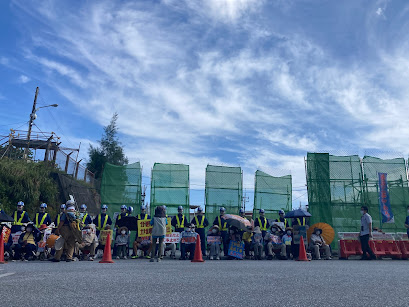A Review of 2022: Environment, Peace, and Human Rights
For the Okinawa Environmental Justice Project, the year 2022 has been challenging, but we have seen some silver linings.
High Expectations and the War in Ukraine
We started the year with high expectations. The year marked the 50th anniversary of the reversion of Okinawa and the 50th anniversary of the UNESCO World Heritage Convention. It also marked the 30th anniversary of the Convention on Biological Diversity and the UN Framework Convention on Climate Change. We expected that these historical frameworks would enable us to push our causes forward.
Then came February, Russia invaded Ukraine, and the destruction of human lives, properties, and the environment would follow. With no end in sight, we are reminded of how fragile peace is and how unrelenting war is once it gets started. And in Okinawa, militarization has intensified under the pretext of the Chinese threat. Missile deployment to our islands is now underway, and military jets emitting loud noise are flying over our islands daily. The U.S. military base construction at Henoko-Oura Bay and the military training in the Yambaru forest continued as if the environment and people's lives did not matter. The impacts of the war in Ukraine and the gloomy prospect of a war in Asia have made us wonder about our efforts to save endangered species, the environment, and World Heritage sites.
OEJP as an Okinawa-based project
We have endured the year, however, by examining the Okinawa Environmental Justice Project as an Okinawa-based project and engaging in what we could do. We became more conscious that, because we are in Okinawa, we are in a better position than many other organizations to understand how environment protection, peace, and human rights are closely related. However small our project is, we concluded, we need to strive to be an agency to bring about some positive changes in these interactions.
We made conscious efforts to engage in dialogue and action with various organizations, peace, human rights, environment, domestic, and international. We gave presentations at seminars and webinars and signed many petitions and letters calling for an end to the war in Ukraine. We participated in webinars and talks organized by younger generations.
Heno-Oura Bay and the Yambaru Forest
To stop the Henoko base construction, we carried out a Letter Campaign. We sent a letter to U.S. Congress members to take the initiative to stop the Henoko base construction, close Futenma Air Station, and draw up an alternative plan. We believe this Letter was one of the most comprehensive documents produced describing the issues of the fragile seafloor and the destruction of the environment at Henoko-Oura Bay by base construction. Over 100 civil society organizations and 40 U.S. elected officials at the state and municipality levels joined the Letter. Consequently, according to The Okinawa Times, Jack Reed, chairman of the Senate Armed Service Committee, expressed that he would study the issues of the fragile seafloor.
To protect the Yambaru forest, we worked closely with the World Heritage Watch. The WHW provided opportunities to present our concerns to the UNESCO World Heritage Centre and IUCN regarding the presence of the U.S. military's Northern Training Area just next to the UNESCO World Natural Heritage site, the impact of its training on the wildlife, and the U.S. military's waste left in the WNH site. We participated in a UNESCO-NGO forum organized by WHW, and we contributed a chapter to the World Heritage Watch 2022 Report. Our efforts have helped lead the Okinawa Defense Bureau to clean up the waste the U.S. military left in the World Heritage site.
Moving Forward and Thank You!
We all know we have a long way to go before we can truly celebrate any of our accomplishments. Throughout the year, the Japanese government pushed forward the base construction at Henoko-Oura Bay, claiming "no impact on the environment from base construction." The U.S. military continued its jungle training and aircraft training in the Yambaro forest while withholding reports on the impacts of military training on the UNESCO World Heritage site. So, we need to do better next year and we promise to do better next year.
We express our sincere appreciation to those individuals and organizations who collaborated with and supported the OEJP throughout this challenging year. THANK YOU!
Hideki Yoshikawa
Director
Okinawa Environmental Justice Project




